Daily Vocabulary Words: List of Daily Used Words in Leading International Newspapers
Hi there. Welcome to this special section @ Wordpandit.
Our endeavour here is very simple: to highlight important daily vocabulary words, which you would come across in leading newspapers in the country. We have included the following newspapers in our selection:
• The New York Times
• The Washington Post
• Scientific American
• BBC
• The Guardian
• Psychology Today
• Wall Street Journal
• The Economist
We are putting in extensive work for developing your vocabulary. All you have got to do is be regular with this section and check out this post on a daily basis. This is your repository of words that are commonly used and essentially, we are posting a list of daily used words. Hence, this has significant practical application as it teaches you words that are used commonly in leading publications mentioned above.
Visit the website daily to learn words from leading international newspapers.
WORD-1: Eroding
CONTEXT: Israel’s popularity has been eroding across the Western world since Oct.
SOURCE: New York Times
EXPLANATORY PARAGRAPH: Imagine a sandcastle you build on the beach. When the waves come and take some of the sand away, making your castle smaller, that’s like eroding. It’s when something slowly wears away or diminishes over time.
MEANING: Gradually wearing away or diminishing (verb).
PRONUNCIATION: ih-ROH-ding
SYNONYMS: wearing away, deteriorating, corroding, disintegrating, crumbling
USAGE EXAMPLE:
1. The constant rain was eroding the edges of the cliff.
2. Wind and water erosion are common causes of soil loss.
3. The river eroded the banks, changing its course over time.
4. The old statue was eroding due to exposure to the elements.
WORD-2: Willingness
CONTEXT: Imagine if Israel tomorrow announced a freeze on new settlements, a willingness to transfer more governing and security responsibilities to the Palestinian Authority in the West Bank and Gaza.
SOURCE: New York Times
EXPLANATORY PARAGRAPH: When you really want to help your friend with something, and you say “yes” happily, that’s showing your willingness. It’s about being ready and happy to do something.
MEANING: The state of being ready and eager to do something (noun).
PRONUNCIATION: WIL-ing-ness
SYNONYMS: eagerness, readiness, enthusiasm, cooperation, consent
USAGE EXAMPLE:
1. She showed great willingness to learn new skills.
2. His willingness to help others made him a popular volunteer.
3. The team’s willingness to collaborate led to a successful project.
4. Without willingness to change, progress can be difficult.
WORD-3: Delegitimize
CONTEXT: It means we cannot continue to easily delegitimize Israel in the West.
SOURCE: New York Times
EXPLANATORY PARAGRAPH: Imagine if someone said your favorite game isn’t real or that you’re not allowed to play it. That’s like trying to delegitimize it, meaning they’re trying to make it seem less important or valid.
MEANING: To undermine or make something seem less valid or legitimate (verb).
PRONUNCIATION: dee-LEJ-it-uh-mize
SYNONYMS: undermine, discredit, invalidate, diminish, question
USAGE EXAMPLE:
1. The false rumors were meant to delegitimize the company’s reputation.
2. His opponents tried to delegitimize his achievements with unfounded allegations.
3. The goal of the campaign was to delegitimize the authority of the government.
4. It’s unfair to delegitimize someone’s accomplishments based on rumors.
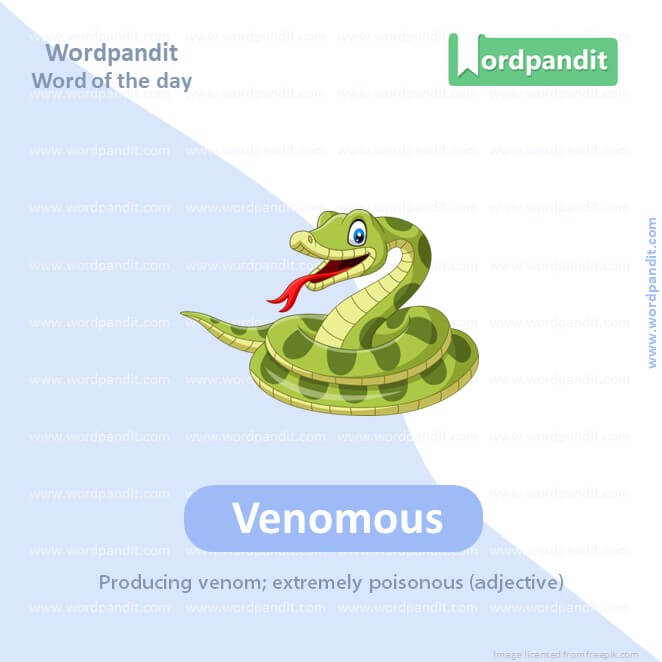
WORD-4: Venomous
CONTEXT: It would also mean that Iran would no longer be able to pose as the great defender of the Palestinian cause — a pose that simply disguises its venomous desire to destroy the Jewish state and deflects attention from its crushing of its own people, particularly women and girls, and their democratic aspirations.
SOURCE: New York Times
EXPLANATORY PARAGRAPH: Imagine a snake that can bite and make you feel very sick. That snake is venomous, meaning it has poison that can harm you.
MEANING: Producing venom; extremely poisonous (adjective).
PRONUNCIATION: VEN-uh-mus
SYNONYMS: poisonous, toxic, deadly, lethal, harmful
USAGE EXAMPLE:
1. The spider’s bite was venomous, requiring immediate medical attention.
2. Venomous snakes are dangerous and should be avoided.
3. Certain plants can be venomous if ingested.
4. The venomous nature of the chemical was well-known among researchers.
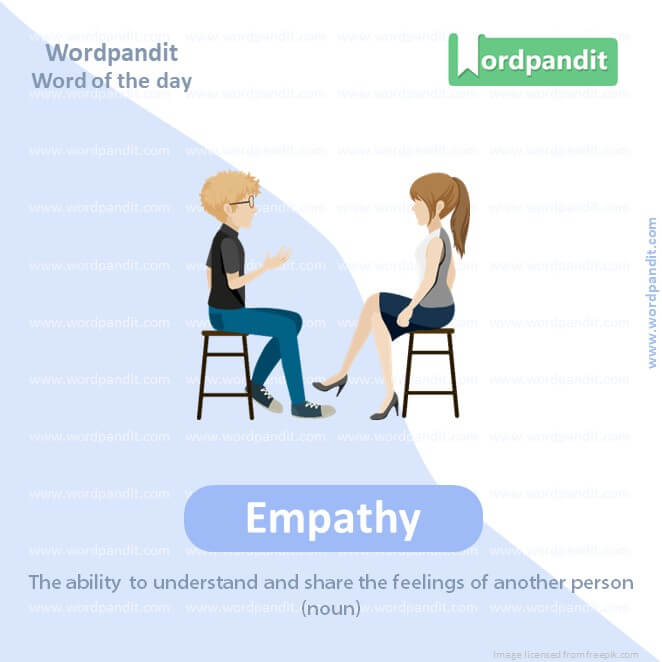
WORD-5: Empathy
CONTEXT: He wanted to try to help viewers who might ignore their homeless neighbors see them not with scorn, or indifference, but empathy.
SOURCE: New York Times
EXPLANATORY PARAGRAPH: Imagine if you fell and scraped your knee, and your friend gave you a hug and said they understand how it feels. That’s empathy—it’s when you understand and share someone else’s feelings.
MEANING: The ability to understand and share the feelings of another person
(noun).
PRONUNCIATION: EM-puh-thee
SYNONYMS: compassion, understanding, sympathy, sensitivity, kindness
USAGE EXAMPLE:
1. Her empathy towards animals led her to become a veterinarian.
2. Showing empathy during difficult times can strengthen relationships.
3. Empathy is an important trait for effective communication.
4. The novel’s characters were designed to evoke empathy from readers.
WORD-6: Involuntarily
CONTEXT: As the homeless plaintiffs wrote, this would be “punishing the city’s involuntarily homeless residents for their existence.”
SOURCE: New York Times
EXPLANATORY PARAGRAPH: Sometimes when you’re sleepy, your eyes close by themselves. That’s happening involuntarily—it’s when something happens without you wanting or trying to do it.
MEANING: Without intentional control or will (adverb).
PRONUNCIATION: in-VOL-uhn-ter-uh-lee
SYNONYMS: automatically, spontaneously, instinctively, reflexively, unwittingly
USAGE EXAMPLE:
1. She involuntarily flinched when the loud noise startled her.
2. His muscles tensed involuntarily in response to the sudden movement.
3. The medicine caused her hand to shake involuntarily.
4. Laughter erupted involuntarily at the comedian’s funny joke.
WORD-7: Stemming
CONTEXT: Abortion could be a decisive issue in Mr. Biden stemming this erosion of support in Arizona and Nevada.
SOURCE: New York Times
EXPLANATORY PARAGRAPH: Imagine a tree with many branches. If you stop those branches from growing, you’re stemming their growth. It’s like controlling or stopping something from spreading out.
MEANING: Preventing something from spreading or developing (verb).
PRONUNCIATION: STEM-ing
SYNONYMS: stopping, halting, curbing, containing, restraining
USAGE EXAMPLE:
1. The vaccination program aimed at stemming the spread of the disease.
2. Measures were taken to stem the decline in the company’s profits.
3. The new policy is expected to help stem illegal immigration.
4. Education plays a crucial role in stemming ignorance and prejudice.
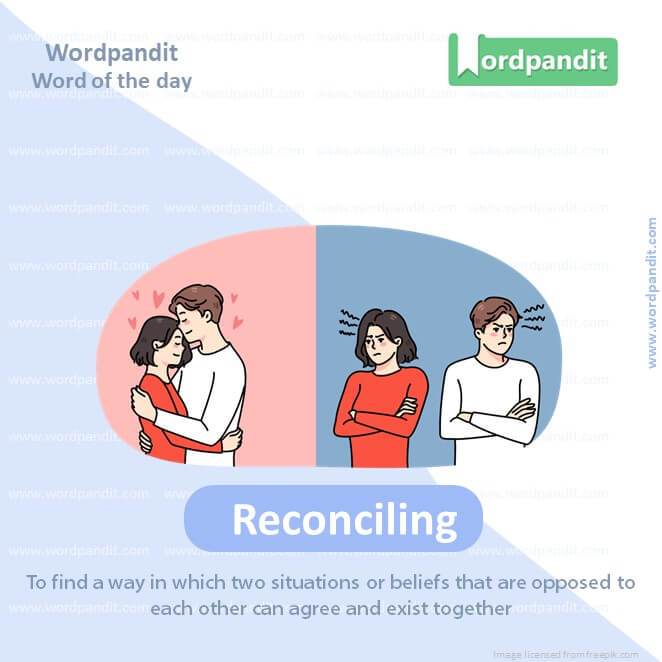
WORD-8: Reconciling
CONTEXT: Tasked with reconciling the state’s abortion laws, some more permissive than others, the Arizona court chose the most restrictive option available — one that ties the hands of Arizona residents with the restraints of yesteryear, forged by the settlers of a not-yet-state in the middle of the 19th century.
SOURCE: New York Times
EXPLANATORY PARAGRAPH: Imagine two friends who had a fight but then say sorry and become friends again. That’s reconciling—it’s when people make up and become friendly again after a disagreement.
MEANING: To find a way in which two situations or beliefs that are opposed to
each other can agree and exist together.
PRONUNCIATION: REK-uhn-sy-ling
SYNONYMS: making up, resolving, harmonizing, settling, repairing
USAGE EXAMPLE:
1. The mediator played a crucial role in reconciling the two warring factions.
2. They spent hours reconciling their differences and finding common ground.
3. Reconciling conflicting schedules was a challenge for the event organizers.
4. Reconciling financial records is an important task for accountants.
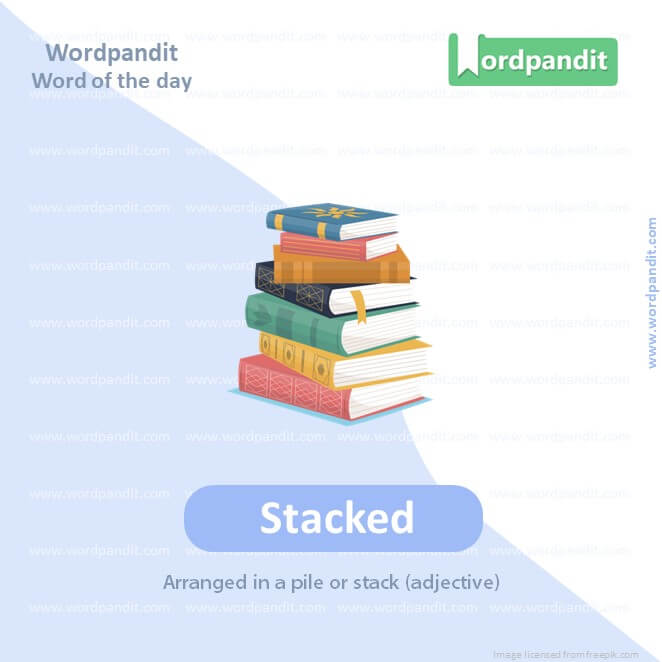
WORD-9: Stacked
CONTEXT: Ducey then stacked this enlarged court with reliable conservatives.
SOURCE: New York Times
EXPLANATORY PARAGRAPH: Imagine a tower of blocks or books placed one on top of another. When things are piled up like that, they’re stacked. It’s about things being arranged in a neat, vertical way.
MEANING: Arranged in a pile or stack (adjective).
PRONUNCIATION: STACKT
SYNONYMS: piled, heaped, layered, arranged, stacked up
USAGE EXAMPLE:
1. The papers on his desk were stacked in an organized manner.
2. She found the books stacked neatly on the shelves.
3. The dishes were stacked in the kitchen sink.
4. The boxes were stacked high in the storage room.
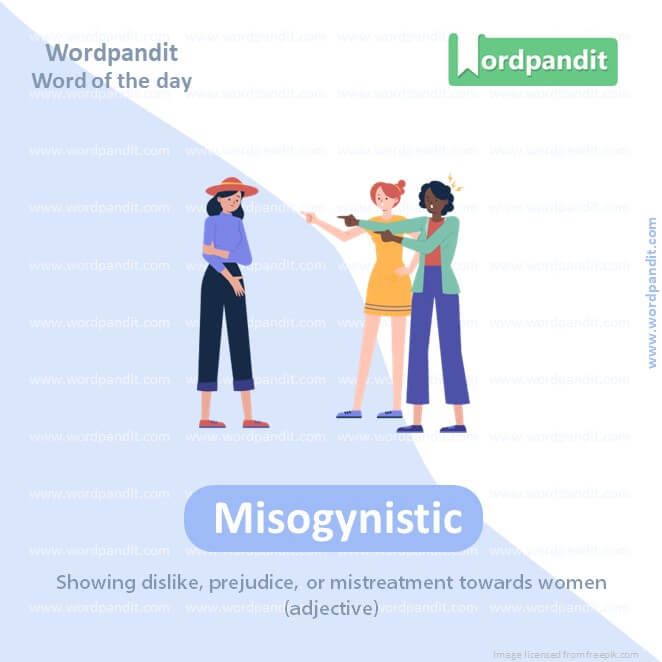
WORD-10: Misogynistic
CONTEXT: the right-wing imagination, for a virtuous, hierarchically ordered past that can be restored in a sexually repressive and tyrannically misogynistic future.”
SOURCE: New York Times
EXPLANATORY PARAGRAPH: Imagine if someone said that boys are better than girls at everything. That’s being misogynistic—it’s when someone has unfair beliefs or actions against women or girls.
MEANING: Showing dislike, prejudice, or mistreatment towards women (adjective).
PRONUNCIATION: miss-uh-JIN-ist-ik
SYNONYMS: sexist, chauvinistic, prejudiced, anti-women, woman-hating
USAGE EXAMPLE:
1. His comments about women were considered misogynistic by many.
2. The book received criticism for its misogynistic portrayal of female characters.
3. Misogynistic attitudes have no place in a modern society.
4. Her experiences with misogyny motivated her to advocate for women’s rights.
Vocabulary In English
Dancing within the vibrant scheme of language learning, a profound understanding of ‘vocabulary in English’ is indispensable. These sets of words, serving as the pillars of communication, lay the foundation for effective and fluent exchange of ideas. Yet the question begs, how should one go about mastering ‘vocabulary in English’?
Embracing ‘vocabulary in English’ demands a well-rounded understanding, far more than mere surface memorization. It is of immense benefit to explore a variety of reading materials, such as books, newspapers, magazines, and online content. This broad exposure yields a practical understanding of how and when words are used, thereby enriching your command over ‘vocabulary in English’.
To aid the learning of ‘vocabulary in English’, memory-enhancement techniques come to the rescue. Regularly using flashcards, or applications that reinforce the principles of spaced repetition, can drastically improve memory retention. Aiding this, the use of mnemonic devices to associate words with unique stories or images in your mind has shown to greatly assist recall.
Practical application further paves the way for mastering ‘vocabulary in English’. By using the learnt words actively in your daily conversations, you cement their grasp in memory and understand their practical usage.
Rounding off, regular reviews of ‘vocabulary in English’ is the secret ingredient in the recipe for success. Consistent revision sessions solidify the retention of previously learned words and maintain a fresh connection with them.
To conclude, the path to mastering ‘vocabulary in English’ is an insightful journey, made enjoyable with diverse resources, effective memory techniques, practical usage, and regular review sessions. As you immerse into this linguistic voyage, every word you learn brews a unique tale, enhancing the narrative of your language proficiency and guiding you towards becoming a skilled communicator.







